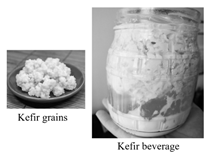Kombucha and Kefir are Foods of the 21st Century: A Opinion by Karina Teixeira, Magalhães-Guedes* in Journal of Biotechnology & Bioresearch_ Journal of Biotechnology

Abstract
Kefir
is a fermented milk product having slight acidic taste, carbonation, and aroma
good. The kefir beverage contains a specific mixture of microorganisms (lactic
bacteria, acetic bacteria e yeast) that reside in symbiotic manner in a kefiran
polysaccharide matrix. Kefir grains (Figure 1 & 2) can be characterized as
small cauliflower florets, having a length of 10-40mm, irregularly shaped,
white to yellowish in color, having firm texture and slimy appearance. The
kefir microorganisms have a capacity to produce organic acids, antibiotics, and
numerous types of antimicrobials; these substances have a lethal effect on
pathogenic microorganisms of
the body. Kefiran is an exopolysachhardie component of kefir grain that has
significant importance in human health and nutrition.
kefir
beverage is being used as prophylactic to lessen the threat of allergy,
gastrointestinal diseases, and hypertension [3]. Kefir beverages also find
acceptance for infants and preschoolers as naturais diet. kefir is efficient in
lowering infections of small intestine in young ones and infants. Based on
these nutritional claim’s kefir beverage can be classified as naturais probiotic resource.
consumed
for its beneficial effects on human health. This nutritive beverage has been
consumed in many countries for a very long time, and today interest is growing
because scientific reports indicate that kombucha tea could prevent chronic
diseases. Kombucha has a beneficial effect such as antibiotic properties,
regulation of gastric, intestinal and glandular activities, relief of joint
rheumatism, gout and hemorrhoids, positive influence on the cholesterol level,
arteriosclerosis, toxin excretion and blood cleansing, diabetes, nervousness,
and aging problems.
Nutritive
ability of kombucha tea can be explained by the formation of iron and gluconic
acid, which increases the level of blood hemoglobin and stimulates Adenosine
Triphosphate (ATP) synthesis. Vitamin C synthesized by kombucha tea, can
enhance absorption on nonheme (plant-derived) iron. Vitamin B group also
synthesized by kombucha tea can promote the enzymatic activation for lipid and
protein metabolism. The Central Oncological Research Unit in Russia have
conducted population investigations on kombucha tea and have determined that
consumption of this beverage on a daily basis has correlation with resistance
to cancer [4]. The kombucha tea modulates immunity and prevents cancer
proliferation at early phase of hormone-dependent tumor cell growth, due to the
synergetic action of kombucha tea symbiosis. May have an effect against breast
cancer. The potential health benefits of kombucha tea in humans are vast and
potentially important for population health.
https://crimsonpublishers.com/jbb/fulltext/JBB.000532.php
For
more articles in Journal of
Biotechnology,
Please
click on below link: https://crimsonpublishers.com/jbb/



No comments:
Post a Comment